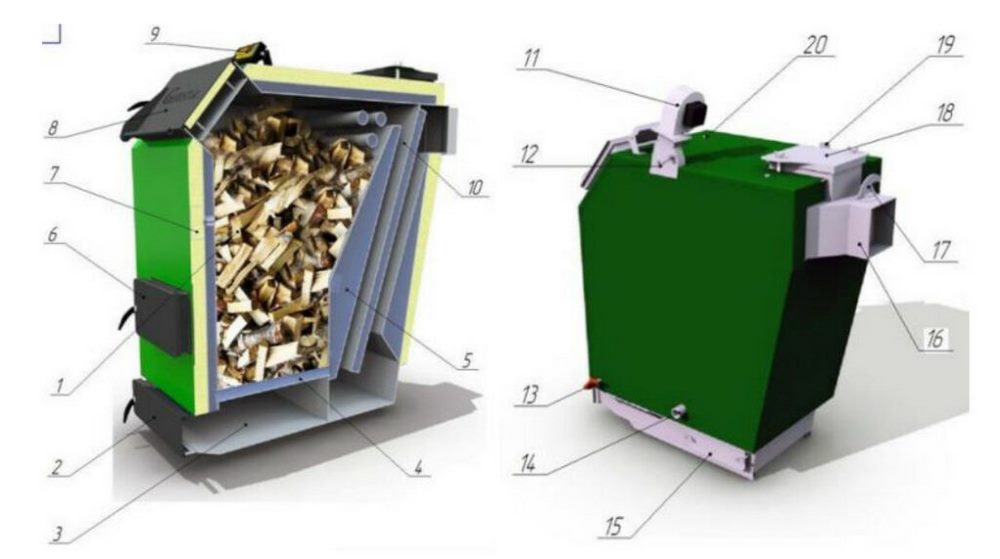Diy heat exchange circuit and pellet burner for boilers
Boiler for pellet burner do it yourself
In our publications, we have repeatedly raised the issue that a powerful pellet burner for boilers does not solve the problem of high efficiency. It is important to consider the heat exchange circuit as an important boiler design. Today we will tell you about the design of the boiler-furnace of the heating engineer Rusinov, familiarization with which will reveal many secrets of the internal structure of a high-performance pellet boiler.
It will be about a heat exchanger capable of transferring maximum thermal energy to water or another heat carrier. The boiler is designed for mine loading of wood fuel, but can be adapted for a pellet burner. In this case, a pellet burner for boilers is installed at the bottom of the combustion chamber, the supply of pellets is provided from the hopper automatically.
How the legendary Rusinov heat exchanger appeared
G. Rusinov was a professional heating engineer and is well acquainted with various furnace designs. Their feature is to accumulate heat in the gross. However, with the growing popularity of hot water heating, massive stoves have become an undesirable element of building structures. More and more friends asked Rusinov how to make a boiler, efficient and compact.
The engineer noted that water has a high heat capacity, which exceeds the heat capacity of oven bricks by 5 times. But in order to transfer heat to water, a large heating surface is needed, which, as a result, Rusinov's heat exchanger has. It is a record 3 m2. This indicator allows you to make a heater designed for 18,000 kcal / h or 21 kW. What is enough for heating 240 cubic meters of a room.
The pictures show the boiler design, which can be adapted to the installation of a pellet burner, saving on the purchase of a factory model.
Features of the Rusinov heat exchanger
The design of heat exchange implies 6 heat shields: 4 radiation and 2 convection. The heat exchanger is made in such a way that the wood burns inside it. The heat of the coals is absorbed by the lower screen, the energy of the fire is absorbed by 4 radiation screens in the form of three rows of pipes.
Further, heat is taken by convection from the combustion products, which seem to wash two more convection screens and the upper cylinder. Warm water circulates upward into a cylindrical container, which plays a peculiar role of a water gun. Here the temperature levels off. Further, warm water, due to its lower density than cold water, moves to the batteries and returns back. And natural circulation is obtained. Water circulates normally through pipes without a pump, while a fire is burning in the firebox.
Now try to adapt it for the installation pellet burner... At the same time, the disadvantage is the fact that the lower screen will be partially not involved in the system, respectively, the conditions of thermodynamic circulation in the system may change.
Complete the boiler with air ducts and get a combined model
If you supplement the boiler with encircling air ducts, like in Bulerian, then you can also provide air heating. Such a boiler will largely outperform the versions available in stores. The power can reach 30 kW of cheap energy, which you can use at your discretion.
Heat exchanger test: can be mounted pellet burner for boilers
A welded structure is bad because any seam can leak. You can check the seams as follows:
- weld the heat exchanger from the side of the lower inlet;
- to fill with water;
- the outlet is connected to a pressure controlled container;
- the heat exchange circuit is filled with compressed air at a pressure of 1 MPa (10 kg / cm2).
After testing, the combi boiler is ready for operation.
In conclusion, compare the design of the Rusinov heat exchanger and the industrial boiler of the Lithuanian manufacturer.










